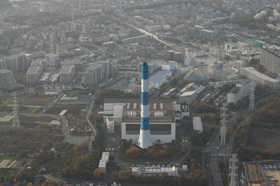Press Information
MHIEC Receives Order to Improve Core Equipment at Municipal Solid Waste Incineration Facility in Yokohama
-- Work at Tsuzuki Incineration Plant Targets Extension of Operational Life and Higher Energy Efficiency of Plant with 1,200 tons/day Capacity -
-- Work at Tsuzuki Incineration Plant Targets Extension of Operational Life and Higher Energy Efficiency of Plant with 1,200 tons/day Capacity -
Tokyo, September 25, 2014 - Mitsubishi Heavy Industries Environmental & Chemical Engineering Co., Ltd. (MHIEC), a group company of Mitsubishi Heavy Industries, Ltd. (MHI), has received an order from Yokohama (Kanagawa Prefecture) to refurbish the core equipment of the city's Tsuzuki Incineration Plant, a municipal solid waste (MSW) incineration facility. The modification work calls for revamping of its stoker furnace*1 type incinerators with a combined processing capacity of 1,200 tons per day (tpd), with the dual aims of extending the plant's operational life by more than 10 years and increasing the output and energy-saving capability of its steam turbine generator. The refurbishing work is slated for completion in March 2018.

The newly ordered work is to consist of replacement and revamping of the plant's core equipment, including facilities for combustion, combustion gas cooling and waste heat utilization as well as electrical instrumentation. Output of the steam turbine will be increased to 13MW and the on-site power generation ratio will be enhanced to permit increased revenues from the sale of electricity. Higher equipment energy efficiency will be achieved through the adoption of high-efficiency motors and inverters in all equipment. The adoption of MHIEC's patented "combustion control system," which contributes to stable combustion, will reduce the volume of waste gas through low-air-ratio operation and promote less energy consumption by ventilators, etc. Together these features will enable a greater than 20% (approx. 2,500 tons) reduction in carbon dioxide (CO2) emissions per year, contributing to curbing of global warming.
Recently the number of projects to modify and improve existing MSW incineration plants, both to extend their operational lives and to reduce their impact on global warming, is in an increasing trend as local governments face tight budgets that make it difficult to construct new facilities. Moves in this direction are also gathering further momentum with the central government's introduction in 2010 of a state subsidy system created to promote operational life extension and enhance energy savings of waste treatment facilities*2.
MHIEC took over MHI's waste treatment plant business in 2008, acquiring MHI's technological development capabilities in environmental systems and its abundant expertise in the construction and operation of waste management facilities both in Japan and overseas. On the strength of these assets, MHIEC today is in a prime position to provide comprehensive solutions encompassing all aspects from plant construction to operation.
Leveraging this latest order and its solid track record, going forward MHIEC will proactively propose further energy-saving enhancements and system improvements for stable operation at existing waste treatment facilities as well as ways to reduce lifecycle costs, including maintenance and management costs, in a quest to expand its business in this field further.
Notes:
1. A stoker furnace is a common feature of MSW incineration plants. In a stoker furnace, MSW is combusted as it moves along on a fire grate made of heat-resistant castings.
2. This program, which falls under the jurisdiction of Japan's Ministry of the Environment, targets effective use and improvement of existing waste treatment facilities as a contribution to the prevention of global warming. Local (city, town or village) governments that seek to extend the operational life of their MSW facilities are eligible to receive subsidies covering one-third to half of the project cost, dependent on the CO2 reduction rate.
About MHI Group
Mitsubishi Heavy Industries (MHI) Group is one of the world’s leading industrial groups, spanning energy, smart infrastructure, industrial machinery, aerospace and defense. MHI Group combines cutting-edge technology with deep experience to deliver innovative, integrated solutions that help to realize a carbon neutral world, improve the quality of life and ensure a safer world. For more information, please visit www.mhi.com or follow our insights and stories on spectra.mhi.com.






